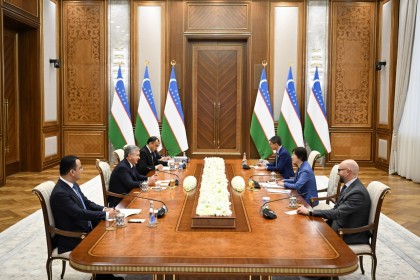On July 13-14, 2022, the Government of Uzbekistan and the World Bank organized a high-level meeting involving senior government officials from the five countries of Central Asia responsible for the human, animal, wildlife and environmental health, and agricultural sectors. They discussed ways to strengthen the regional collaboration in protecting food systems and preventing future pandemics, animal and human disease outbreaks and antimicrobial resistance.
Over 50 participants from Central Asian and various international institutions discussed the scope and broad lines of a Central Asia One Health Framework for Action. They included senior officials of ministries, state committees and services of Kazakhstan, Kyrgyz Republic, Tajikistan, Turkmenistan and Uzbekistan responsible for agriculture and food safety, healthcare, sanitary and epidemiological control, veterinary, livestock development, and environment protection.
The World Organization for Animal Health estimates that about 75% of all human emerging infectious diseases have an animal origin (e. g. SARS, Ebola, swine and avian flu, brucellosis, and rabies) and are thus zoonoses. Out of the five new human diseases that emerge each year, at least three are of animal origin.
Managing global health risks requires full cooperation between the animal, environmental and public health sectors, at the national, regional, and global levels. One Health is a collaborative approach that brings these sectors together to prevent, detect, respond to, and recover from infectious diseases, aiming at improving global health security and achieving gains in development.
In Central Asia, a One Health approach would contribute to improving (i) productivity and trade of animals and animal products; (ii) effectiveness of the preparedness and response to the animal and human disease outbreaks; and (iii) savings from sharing crucial information on animal and human health generated by national surveillance systems and high-level infrastructures.
The objective of the high-level meeting in Tashkent was to operationalize a One Health approach in Central Asia. The event was sponsored by the World Bank and held in close coordination with the Food and Agriculture Organization (FAO), World Organization for Animal Health (WOAH), World Health Organization (WHO) and UN Environment Program (UNEP), which are promoting regional and cross-sectoral cooperation for a One Health approach to the animal, environmental and human health issues in Central Asia.
“The World Bank has been actively engaged in the region for three decades, including through financing multimillion projects in the areas of agriculture, health, and livestock implemented by the Central Asian governments,” said Tatiana Proskuryakova, World Bank Regional Director for Central Asia, addressing the participants of the high-level meeting in Tashkent. “A comprehensive response to implementing a One Health approach in the region will only be possible through high-level agreement and coordinated action between the Central Asian countries. Thanks to its financial resources and multisectoral expertise, the World Bank is well-placed to help them achieve this goal, working in close collaboration with the national and international partners”.
The meeting participants analyzed existing risks for animal and human health in Central Asia, including their countries’ experience in addressing zoonotic diseases, antimicrobial resistance and food safety concerns. They considered existing challenges and opportunities for creating regional collaboration mechanisms to prepare for future animal and human disease outbreaks, and to address the issues associated with transborder movements of animals and their products.
The meeting participants discussed further steps needed to prepare the Central Asia One Health Framework for Action and establishing the relevant working groups. This document would provide a blueprint for the countries in the region to move forward with concrete actions, as well as would include a roadmap for investments at national and regional levels.
The preparation of the Framework is expected to span over the next year until July-September 2023 and would include high-level meetings, technical workshops, and analytical work. The formal initiation of the work would take place during a high-level ministerial meeting proposed to be organized in October 2022.












